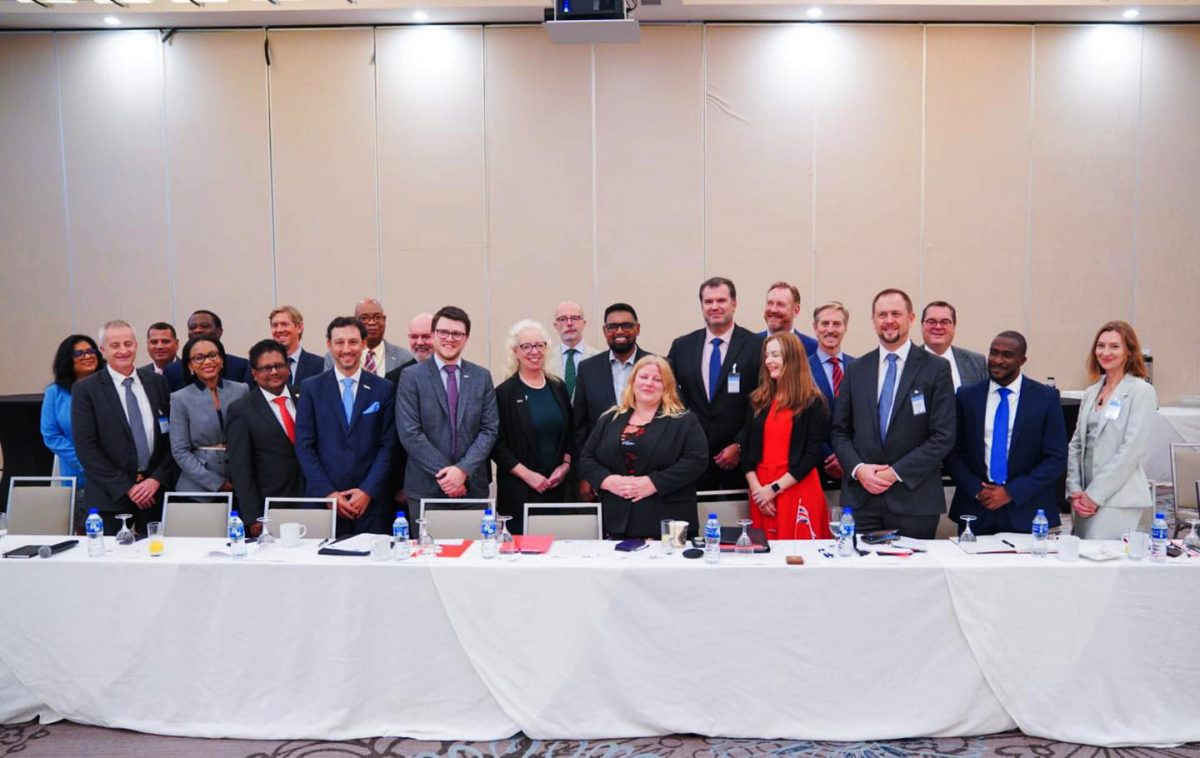Georgetown and London yesterday signed a trade and technical partnership agreement, with President Irfaan Ali leading his government’s team during technical discussions with a delegation headed by UK Trade Commissioner for Latin America and the Caribbean, Jonathan Knott.
The signing was held at the Marriott Hotel and follows up from a March meeting with previous United Kingdom Prime Minister Boris Johnson.
“This partnership arrangement aims to deepen the business, trade and technical cooperation between the Parties. The Parties will establish a working Group and Action Plan to examine specific areas of deeper collaboration with the goal of establishing a Government to Government Agreement for enhancing partnership for mutual benefit,” the agreement states.
Signatories to the agreement were Foreign Affairs Minister, Hugh Todd; British High Commissioner to Guyana, Jane Miller; and Knott.
After the signing, Ali told the delegation that his government wants investors from around the world to come here to grow their money and help this country reach its development targets.
He made mention of the UK’s assistance to Guyana and by extension the Caribbean, as he lauded its loan terms which allow for greater local content participation, as compared to borrowing from other countries which restrict contractor participation to its citizens.
“The difference with UKCIF and the UK and any other financing is that their financing comes with only 20% tied direct services. If you have a contract that is worth $200 million, the only requirement is 20% of $200 million,” he explained.
He told the UK delegation that while this country’s private sector especially, would benefit from partnerships and other investment forms, it was not one-sided because those holding the British pound sterling would see equal rewards from their businesses with government’s support in giving incentives.
He urged business investors from the UK to make use of the opportunities now because in later years, and mostly when the flagship gas-to-shore power generation plant begins operations and supply, the cost of investing here could increase significantly.
“All of this will lead us to a position in a few years where our energy costs will be down by 50%. You don’t want to be coming on the scene when that occurs. And I’m telling you in 2025 [power costs] will be down by 50%. So you need to have your infrastructure in place for manufacturing, industrial… understanding the geographical significance of Guyana and the market that you’re playing in, because Guyana is going to become a major industrial manufacturing and agricultural hub.”
“We will give incentives during this phase of development for investors who are coming in to us but that phase won’t last forever. Very frankly, I said before, two years ago, I said the cost of investing in Guyana will continuously increase… this is the period of the cycle of business growth. This is the period of actualization when the balance sheet and the profit statement will not be overwhelming…,” the president added.
As development plans tie in with investment opportunities, he noted that his government was “actively pursuing and has actively pursued, as a country, different models and different opportunities.” The key areas being focussed on “heavily” are technology transfer, governance system proficiency, and modernising manual systems, in order to be globally competitive.
Luxury of unleashing
And while this country’s sustainability plan is hinged on diversification across all platforms of development and sectors, Ali said that this country’s hydrocarbon resources will be utilised to ensure objectives are reached.
It is why he made a pitch to the UK delegation to let it be known to their investors that oil blocks will be available through auction and they can tap in.
“I want to encourage you to look beyond the borders. We are going out to some additional blocks, if you have joint consortiums that are interested in those blocks, definitely take the opportunity.”
Energy security, he reasoned, should not just be looked at as a need for Guyana alone, as the UK could see significant benefits for its citizens in immediately partnering in the sector, as plans are in the making to forge ahead with future climate decarbonisation activities. This reality, according to Ali, became more evident during the COVID-19 pandemic and the current Russia/Ukraine conflict.
It is why Guyana has put out an Expression of Interest for a 30,000-barrel-per-day oil refinery here, an investment that UK investors could explore partnering in.
“The refinery Expression of Interest, as you notice, it is just a 30,000 barrel per day… what we understand clearly is that we need national security when it comes to refining products and oil products. And if you get the opportunity to get the private sector to be able to invest in it; [to] give you that kind of national security… that is [great]. We don’t have the luxury of unleashing a reserve by the click of a finger when things get tight,” he posited.
“There are countries that have these reserves. UK, you don’t have it. You are faced with the full brunt of the open market. I think together, we should work on seeing how to support each other because if there are definitely ways in Guyana, in which even your energy security can be secured to avoid us doing the transition, it will happen. Hydrocarbons still have a long enough play in the market. The problem is avoiding going back to coal. The lesser harm is hydrocarbon and we have to see how that hydrocarbon security brings security to the UK for example, in the period of transition”, Ali added.
Shared ambition
For his part, the Trade Commissioner for Latin America and the Caribbean at UK Department for International Trade declared that the UK “would like to be a part of that vision” that Guyana has set out.
“We share your ambition in particular the transformation of economic growth for the country, for faster, fairer, for greener growth. We share your ambition to build its capacity and capability. We share your vision for Guyana and investment and being the Caribbean gateway to Latin and South America,” Knott said.
“We share your vision for health care and services for the people, for education… we share your vision around food security, around the provision of food for the rest of the Caribbean. We would like to help you deliver that. British businesses, we’d like to help you deliver that vision,” he added.
Knott highlighted the terms of the agreement as he pledged to help deepen ties.
Terms of reference of the agreement note that a Working Group will be comprised of members delegated by each country and agreed to at their first meeting. It is expected that on February 15, 2023, the Working Group will present the first draft of its Action Plan, which will include “a substantive and priorities list of funded and specific projects, including timelines for delivery and the Government of Guyana would wish to match with UK capability and expertise.”
“The action plan will also cover immediate funded programmes and their progress as identified at the meeting on November 16, as well as those projects where the Government of Guyana would wish to explore UK export finance opportunities,” the document adds.
Its areas of co-operation represent a framework of Guyana-UK government and business collaboration across a range of sectors, and is intended to support the delivery of specific programmes and projects which advance the objectives outlined in document.
“The parties agree to establish a joint working group which will define and deliver a time-bound Action Plan, recognizing the content of the Action Plan may change over time. The Action Plan will aim to deliver the innovation, technology and knowledge needed to support faster, fairer, and greener growth in Guyana. For Faster Growth, the working Group will identify further commercial collaboration between Guyana and the United Kingdom to support the development and implementation of Guyana’s national Infrastructure Plan. This will ensure that an integrated approach to infrastructure planning and project management meets Guyana’s vision for rapid development, modern, green and innovative growth. The Working Group will also explore projects that could be financed through UK Export Finance,” it states.
“For Fairer Growth, the working group will identify commercial collaboration opportunities in social sectors. This will include educational technology to support the Government of Guyana’s vision for a world class, cutting-edge education sector, bringing EK Ed-Tech companies, and UK educational providers at the forefront of innovation and research to these discussions. The parties will explore further commercial collaboration in social infrastructure in Guyana – and social housing in particular – to accelerate delivery against a key social housing programme with UK commercial support. For greener Growth, the parties will develop a joint plan to increase links between Guyana and the UK Agri-Tech business and academic sector to include a wide range of capability from livestock genetics research to drone technology. The Parties will further extend the plan to incorporate opportunities for renewable energy technology, expertise and infrastructure,” it adds.
The UK has also pledged to continue to work with Guyana on climate and environmental priorities in line with this country’s Low Carbon Development Strategy. “The Parties will explore opportunities to expand their ongoing work related to the Green and Blue economy. This will include exploring further work in the forestry sector, access to climate finance, as well as potential support to build the marine/blue economy,” the agreement states.








